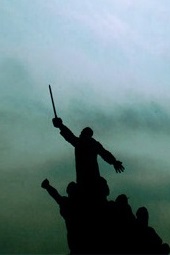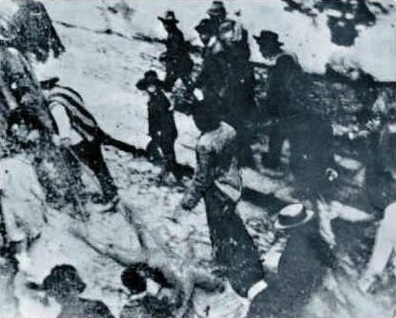 More than a century after Alfaro’s Revolution his legacy lives on in Ecuador
More than a century after Alfaro’s Revolution his legacy lives on in Ecuador
Eloy Alfaro, Ecuador’s great revolutionary, fought for equal rights for all. Although he was assassinated in 1912, he made a lasting contribution to his country, turning Ecuador into a modern secular state.
118 years after Alfaro's Revolution his legacy continues in Equador
“Después de 118 años de la Revolución Alfarista su legado sigue vigente en Ecuador”
Andes, 2013-06-05
Translated by Patrick Joseph Connolly
 On June 5, 1895, Ecuador embarked on the most important social transformation in its history, the Alfarista (or Alfaro’s) Revolution. This revolution challenged key components of the latifundia system, (huge estates worked by landless peasants), that dominated the country at that time.
On June 5, 1895, Ecuador embarked on the most important social transformation in its history, the Alfarista (or Alfaro’s) Revolution. This revolution challenged key components of the latifundia system, (huge estates worked by landless peasants), that dominated the country at that time.
At the age of only 22, José Eloy Alfaro Delgado, the “old warrior” organized the people and led the first revolutionary action in Montecristi (the province of Ecuador’s Manabi coast) — along with the artisans and merchants of the town — against the government of Gabriel Garcia Moreno.
This revolution established for the Ecuadorian people the foundation for a society of rights, including secular and sovereign rights. Alfaro’s government programme introduced a political constitution that granted civil rights such as freedom of expression, understood as the power of a sovereign people to freely express themselves free from constraints imposed by groups holding the reins of power.
This revolutionary period also finalized the right of civil marriage and gave the Ecuadorian people the heritage of a secular state; that is, a set of civil institutions freed from the interference of clergy and theocracy.
This revolution also created a public system of education which gave us the opportunity to learn reality according to the standards of reason and science.
He even initiated a political system which promoted the participation of women in the public sphere. Alfaro sought integration within the state, while at the same time supporting an effort to define the borders of Ecuador.
Finally, the Alfarista Revolution built the Guayaquil-Quito Railroad, which connected the coast with the mountains, consolidating the national identity and creating an internal market.
On numerous occasions President Rafael Correa has stated that thanks to Alfaro, Ecuador today exists as a country with a national identity and a secular constitution — for which the oligarchic and ecclesiastical powers never forgave him. Alvaro was murdered, his corpse dragged through the streets, while the mob shouted, “Long live religion...” and then burnt, in what has become known as the “Barbaric Bonfire”.
Further reading: Patrick Joseph Connolly, “Eloy Alfaro”, 2011. http://www.fxmartinez.net/?p=49








